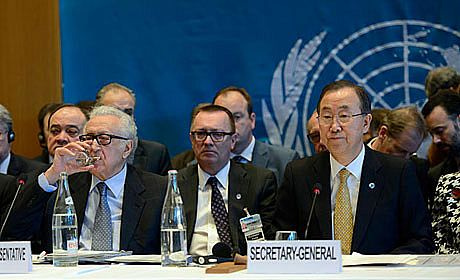Transitional Process, Not Transitional Government

The last round of Geneva-2 talks with regard to the establishment of peace and a cease-fire in Syria ended without any success. Under the circumstances that exist in Syria, one would have been surprised if this conference had reached positive results! Apparently both sides left the negotiation table because they were not able to reach a united position regarding the establishment of a transitional government.
Unfortunately, the UN and its representative in this conference do not take note of the point that the objectives of the inside and outside forces that are involved in this matter are different. The Syrian scene is not a linear equation wherein only the two negotiating parties would be able to solve the problems of this country. This equation is very complex and foreign elements are very effective in the resolution of this issue. Regional forces, like Iran and Saudi Arabia, in the absence of Turkey and Qatar whose financial aids did not prove to be effective and who were eliminated from this equation, and international and extra-regional forces like the US and Russia play significant roles in this matter.
The UN’s mistake began with the Geneva-1 conference. The US and its allies had assumed in the beginning that they could change the Syrian scene like they did in Libya and they sought a replacement plan with the slogan of Bashar Assad’s downfall. Those who participated in the absence of the main and determining elements in the Syrian crisis proposed the idea of a transitional government. This is an issue the dimensions of which have not yet been determined and reaching an agreement about its details would take a long time but no established government which controls even a small part of a country would accept that.
The mere acceptance of the transitional government with the reservation that both sides, meaning the Syrian government and the opposition, must reach an agreement in its details has no legal and political value and needs a long time to achieve an understanding; as it was the case in this round of negotiations because the opposition does not have the power to remove Assad and the Assad government has the upper hand in the operational fields. Thus, it seems that there is no correct and complete understanding of a transitional government which could be accepted by the present government of Syria and the inside and outside opposition, particularly the West and the Arabs. Therefore, in the first stage, the West seeks to establish the formation of the transitional government and in the next step receives concessions from Bashar Assad and eliminates him or his elected government from the transitional process through political and propaganda pressures. Among these propaganda is the talk of the killing of innocent people by government forces on the verge of the Geneva-2 conference.
But in order to reach a comprehensive solution and instead of talking about notions, playing with words, and killing time, a transitional process must be pursued in this country instead of a transitional government, whose details might take months or years to discuss. The transitional process could begin with the legitimate government of Syria under the supervision of an international institution one day after the negotiation and through the establishment of a cease-fire. Then the constitution and the political system could be determined by the people’s votes in Syria in a democratic atmosphere and without any war and bloodshed.

